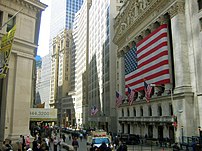Monthly Treasury Statement - July 2008
# Monthly Deficit/Surplus: $102,767 billion deficit
# Prior Year Monthly: $36,447 billion deficit
Spain adds to Europe’s recession chances
The leading index for Spain fell 0.4% in June according to the Conference Board, indicating tough economic times ahead. The coincident index fell by a smaller 0.1%, but the February to May numbers were all revised downward as well.
Foreign Trade (US) - June 2008
# Exports: $164.4 billion
# Monthly Change: Up $6.4 billion
Dude, Where's My Recession? The Series
Thanks to today's trade numbers, it now looks as if the economy grew much faster than 1.9 percent in the second quarter. In their preliminary GDP estimate, government bean counters thought the trade deficit would increase. Instead, it narrowed as exports surged 4.0 percent vs. a 1.8 percent rise in imports. As result, the economy probably grew at least 2.9 percent in the second quarter, if not a bit more.
Trade Gap Narrows on Export Gain
The U.S. trade deficit unexpectedly narrowed to $56.8 billion in June as exports registered their biggest gain in nearly four and a half years.
 Image via Wikipedia
Image via Wikipedia U.S. Deficit Hit $102.77 Billion in July
The U.S. budget deficit nearly tripled in July from a year earlier, pushed in part by aftershocks from failed financial institutions.
Japan economy shrinks on weaker exports, price jump
Japan Q2 GDP contraction adds to recession fears
JP Morgan's $1.5 billion hit [Video]
Aug 12 - JP Morgan warns of a big writedown and says trading conditions have gotten worse.
Japan's Economy Shrank 2.4% in Second Quarter as Exports, Spending Dropped
Japan's economy contracted last quarter, bringing the country to the brink of its first recession in six years, as exports fell and consumers spent less.
Trichet May Look Beyond Contraction, Focus on Threat of Wage-Price Spiral
European Central Bank President Jean- Claude Trichet may look beyond a likely contraction in the euro region's economy and keep interest rates at a seven-year high to avert a wage-price spiral.

0 comments:
Post a Comment